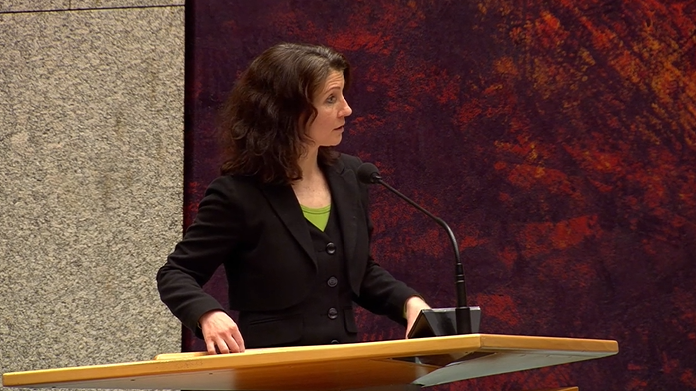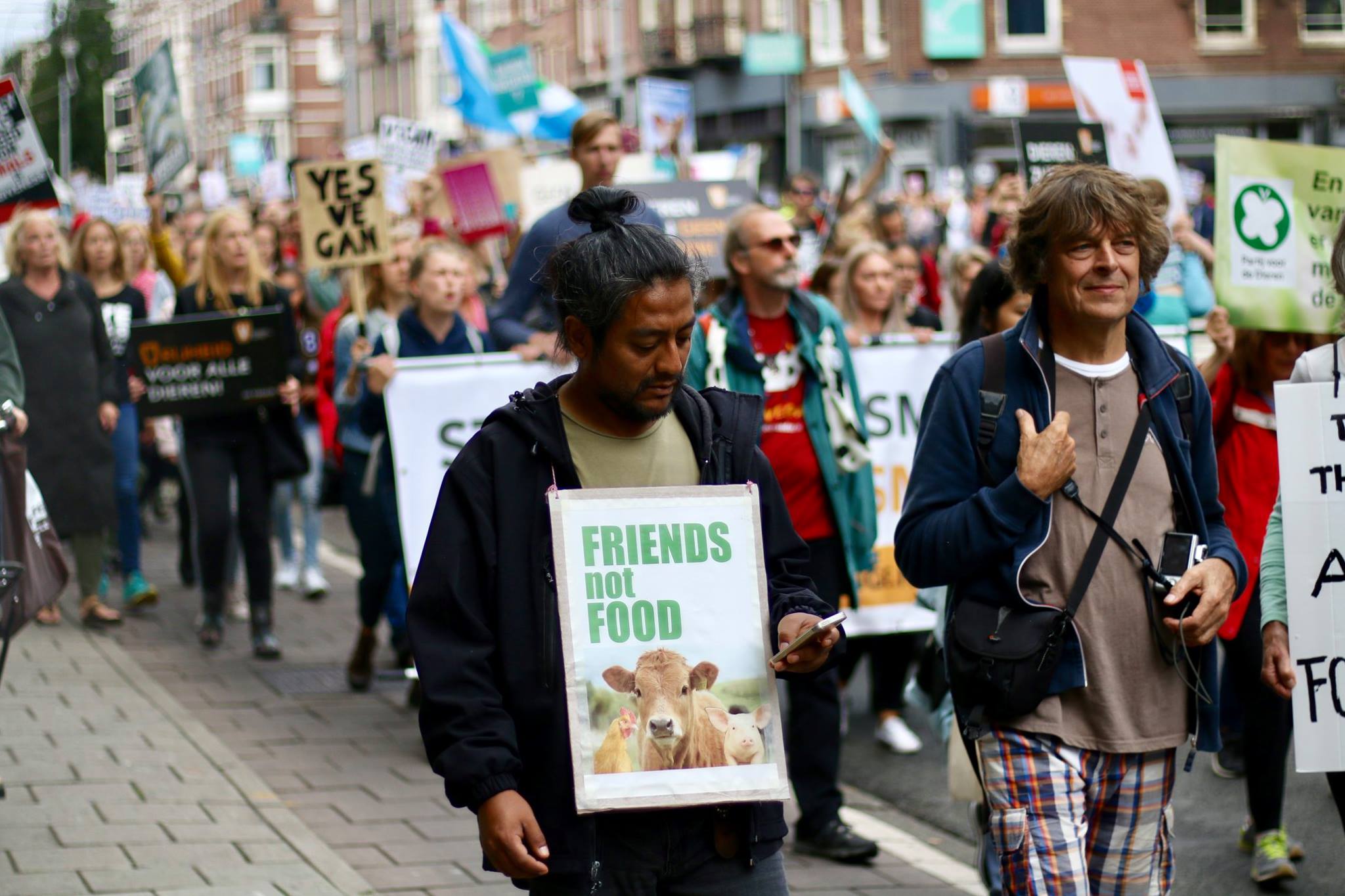Worldlog Esther Ouwehand
In my latest Worldlog of 2018, I announced that in the new year, the Dutch Lower House was going to have a fundamental debate on the suffering and dying of livestock animals. This debate took place two weeks ago, and last week the Lower House voted on the different motions the Party for the Animals had tabled in order to help the animals. We had asked our colleagues of other political parties in advance to show courage, to think about their responsibility for the fate of the over 64 million animals bred, used and killed in the Dutch livestock sector each year.
The debate was a historic one, as awareness in society is growing stronger every day. However, during the debate and subsequent votes, the politicians decided to stand on the wrong side of history once again. Confronted with the large-scale suffering of livestock animals on a daily basis, the majority of our fellow politicians did what they always do: deny and trivialise the facts, and demonise the messenger. Activists who had shown citizens what really goes on behind closed doors with animals, were dismissed as criminals; while it is these very activists who are trying to protect a key value of our democracy: the right to honest information. This right is under pressure as consumers are deceived by their government, supermarkets and the livestock sector: happy animals on brochures and packaging; exploited animals in the stables.

Esther Ouwehand during the debate on animal suffering in livestock sector
It is not the farmers, but the system that is under debate. A system in which people need to be constantly woken up by images of reality, and in which the supervisor fails in upholding the already weak rules. Undercover footage frequently shows pigs, social animals, trapped between bars, forced to watch their piglets being mutilated. Their tails are docked and their teeth clipped without the use of anaesthesia. Although our Minister of Agriculture denies that the practices shown in the images are representative of the sector, they are allowed by the Minister’s own law. The current rules allow for these horror practices.
Over 18 years ago, a majority of the political parties in the Netherlands made a promise that by 2022, the animal’s perspective would be a determining factor in the livestock sector: animals would be allowed to express their species-specific, natural behaviour. So, the good news is that basically, everyone in the Lower House is in agreement: today’s intensive livestock farming, the way the animals in this sector are bred, used and killed, is morally unacceptable. The animal’s intrinsic value is recognised by the Lower House as well as by the law.
However, when actual measures are needed to comply with this view, politicians refuse to take action. What they are actually saying, is “Yes, we recognise the animal’s intrinsic value, but not when it comes to a ‘production animal’. Not when we can use it to make money.” This means that the things you – quite rightly –cannot do to a dog and which will lead to a significant fine or punishment, are allowed by our politicians when it comes to cows, pigs, chickens and goats. Thereby, our Minister of Agriculture and the majority of our fellow politicians have created their own fundamental balancing act.
Animals are conscious, living creatures with feelings. People faced with the day-to-day reality of livestock farming immediately see that the system is utterly despicable. Almost 20 years ago, the animals were promised an end to this system. Now it is up to the Lower House to show they will keep that promise.
Moreover, addressing the issue of the livestock sector is the great taboo in politics, despite it being the most rational and effective solution to animal suffering, environmental damage and climate change. We need to rigorously reduce livestock numbers. It is inevitable. It is not just the Party for the Animals who believes that; it is scientists, and even the Dutch government’s most important advisory bodies. Standing up for animals is the ultimate solution to all the problems we are facing in the world. Not only will we prevent animal suffering, but it will help us solve the problems of climate change and biodiversity loss and defeat hunger in the world. A transition to a plant-based diet will generate a healthy, sustainable and animal-welfare friendly future.

March for Animal Rights in Amsterdam 2018
It is unwise and unfair to have farmers invest even more in a system that we already know to be unsustainable. Instead, we need to prepare our farmers for a plant-based future. That is why the Party for the Animals is proposing to stop the millions in subsidies currently going to Dutch livestock farming and use it instead to scale down the livestock sector. Stop the breeding of animals for slaughters and start the transition to plant-based.
The lobbying body of the intensive livestock sector is extremely powerful. But luckily, more and more people and even companies are making the transition to plant-based. The time is now. After hundreds (!) of years of only a small minority standing up for animals, people are now rapidly gaining more awareness. The animal rights movement is the fastest growing social movement of our time. Join us!
Next Thursday, #Powerplant, our scientific bureau’s newest documentary, will be released in Amsterdam. In the documentary, the opportunities for a plant-based society are examined, as well as how this can save our planet. The documentary will probably be shown around the world, so keep an eye on our social media pages for any updates!
This will be my last Worldlog for now. Our party leader Marianne Thieme has come back from sick leave and will share her experiences with you in the following Worldlogs.
To conclude: click here for a wonderful piece of stand-up comedy by American Peacher Lawson.
Kind regards,
Esther Ouwehand
U mom posljednjem Worldlogu iz 2018. najavila sam da ćemo u novoj godini u nizozemskom Zastupničkom domu održati temeljnu raspravu o patnji i smrti životinja u stočarstvu. Ta je rasprava održana prije dva tjedna, a prošlog je tjedna Zastupnički dom glasao o različitim prijedlozima zakona koje smo podnijeli kako bismo pomogli životinjama. Zamolili smo naše kolege iz drugih političkih stranaka da pokažu hrabrost. Da stvarno razmisle o odgovornosti koju imaju za sudbinu više od 64 milijuna životinja koje se uzgajaju, koriste i ubijaju od strane nizozemske stočarske proizvodnje kroz samo jednu godinu.
Rasprava je bila povijesna jer u društvu postoji svijest koja postaje sve jača i jasnija svaki dan. Međutim, tijekom rasprave i naknadnog glasovanja, politika je ponovno stala na pogrešnu stranu povijesti. Suočena s masovnom i svakodnevnom patnjom životinja u stočarskoj industriji, većina kolega političara nastavila je raditi ono što uvijek čine: poriču, trivijaliziraju i demoniziraju glasnika. Aktivisti koji građanima pokažu što se zapravo događa iza zatvorenih vrata sa životinjama, predstavljeni su kao kriminalci. I to dok ti aktivisti žele zaštititi temeljnu vrijednost naše demokracije: pravo na poštenu informaciju. Ovo pravo je pod pritiskom i vlada, supermarketi i poljoprivredni sektor obmanjuju potrošače: sretne životinje na brošurama i ambalaži, eksploatirane životinje u štali.

Esther Ouwehand tokom rasprave o patnji životinja u stočarskoj industriji
Ne poljoprivrednici, već sustav je za raspravu. Sustav u kojem ljude stalno iznova moramo buditi slikama stvarnosti i u kojima nadzornik neuspješno vodi zbog slabih pravila. Na tajnim snimkama redovito se vide svinje, društvene životinje, zaglavljene između štapova, koje moraju gledati kako se njihova prasad unakazuje. Bez anestezije repovi svinja su odrezani, a zubi su uklonjeni. Ministar poriče da su takve slike reprezentativne, ali ono što vidimo dopuštaju zakoni istog ministara. Postojeća pravila dopuštaju takve prakse užasa.
Prije više od 18 godina, većina političkih stranaka obećala je da će do 2022. godine životinjska perspektiva biti vodeća u stočarstvu: da životinje mogu pokazati svoje prirodno, različito ponašanje. Dobra vijest je da smo u Zastupničkom domu konačno složni: intenzivna stočarska proizvodnja kakva danas postoji, način na koji se uzgajaju, koriste i ubijaju životinje moralno je neprihvatljiva. Vijeće i zakon također priznaju unutarnju vrijednost životinje.
No, ako se moraju poduzeti prave mjere kako bi se ispravili ti zaključci, političari odbijaju poduzeti mjere. Političari tada kažu: “Da, prepoznajemo intrinzičnu vrijednost životinje, ali ne i kada je riječ ‘životinji proizvodnje’. Ne ako možemo zaraditi na tome.”Dakle, što ne možete učiniti s psom za kojeg dobivate veliku novčanu ili zatvorsku kaznu, prema politici, to je dopušteno kod krava, svinja, kokoši i koza. Naš ministar poljoprivrede i većina naših kolega političara stvaraju svoje temeljne podjele.
Životinje su živa bića sa sviješću i osjećajima. Ljudi odmah uviđaju i osuđuju kada ugledaju svakodnevnu stvarnost stočarstva. Prije gotovo 20 godina životinjama je obećano da ćemo zaustaviti ovaj sustav. Na sadašnjem Zastupničkom domu je da ispuni to obećanje životinjama.
Štoviše: rješavanje stočarstva je veliki tabu u politici, dok je to najracionalnije i najučinkovitije rješenje za patnju životinja, štetu koju nanosimo prirodi i klimatske promjene. Moramo strogo smanjiti broj stoke. To je neizbježno.To govori ne samo Stranka za životinje, nego i znanost, pa čak i najvažnija savjetodavna tijela nizozemske vlade. Zalaganje za životinje je švicarski nož svih problema s kojima se moramo boriti u svijetu. Na taj način sprječavamo stradanje životinja i jednim potezom pomažemo zaustaviti klimatske promjene i gubitak bioraznolikosti te je rješenje za glad na svijetu. Prijelaz na povrće je zdrava, održiva i životinjska budućnost.

Povorka za prava životinja Amsterdam 2018
Nije mudro niti pravedno dopustiti poljoprivrednicima da ulažu u sustav za koji već znamo da je neodrživ. Moramo pripremiti naše poljoprivrednike za budućnost povrća. Stranka za životinje stoga predlaže da se koriste milijuni subvencija koje sada idu nizozemskom stočarstvu kako bi se smanjila industrija stoke. Prestanak uzgajanja životinja za klanje i obvezati se na prijelaz na povrće.
Moć lobiranja intenzivnog uzgoja stoke je jaka. No, na sreću, sve je više ljudi, pa čak i tvrtki koje prelaze na povrće. Sada je vrijeme. Nakon svih tih (stotina!) godina tokom kojih se mala manjina uvijek zauzimala za životinje, ljudi sada brže postaju svjesni. Pokret za prava životinja je najbrže rastući društveni pokret našeg vremena. Pridružite se!
U četvrtak će se premijerno prikazati #Powerplant u Amsterdamu, novi dokumentarac iz našeg znanstvenog ureda. Dokumentarac istražuje mogućnosti za biljno društvo i kako to može spasiti planet. Dokumentarac će vjerojatno putovati diljem svijeta, stoga pazite na naše stranice društvenih medija radi ažuriranja!
Ovo je za sada moj posljednji Worldlog. Naša predsjednica stranke Marianne Thieme vratila se s bolovanja i podijelit će svoja iskustva s vama u sljedećem Worldlogu.
Za kraj: klikni ovdje za krasan djelić stand-up komedije od Amerikanca Preachera Lawsona.
Pozdrav,
Esther Ouwehand